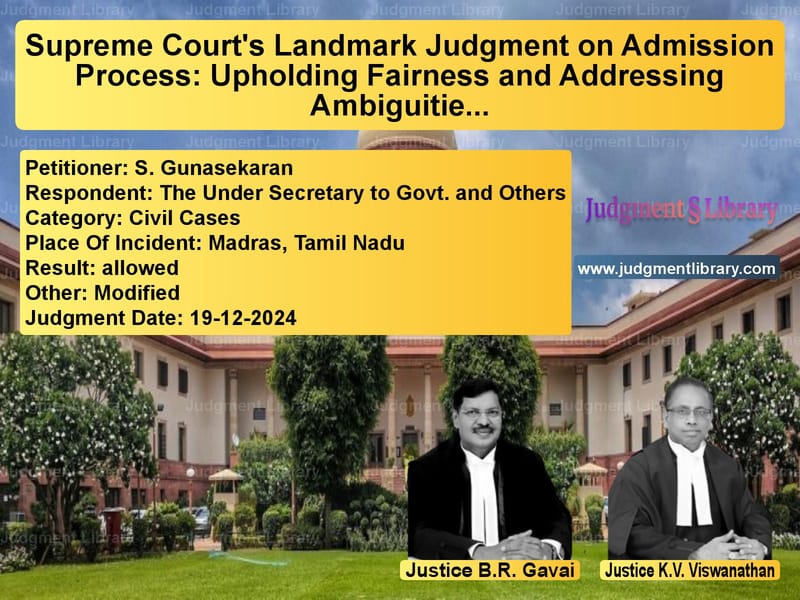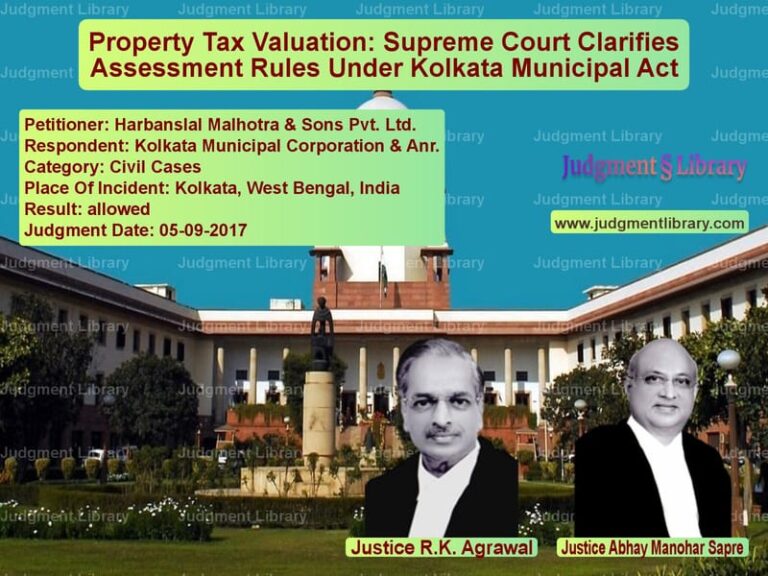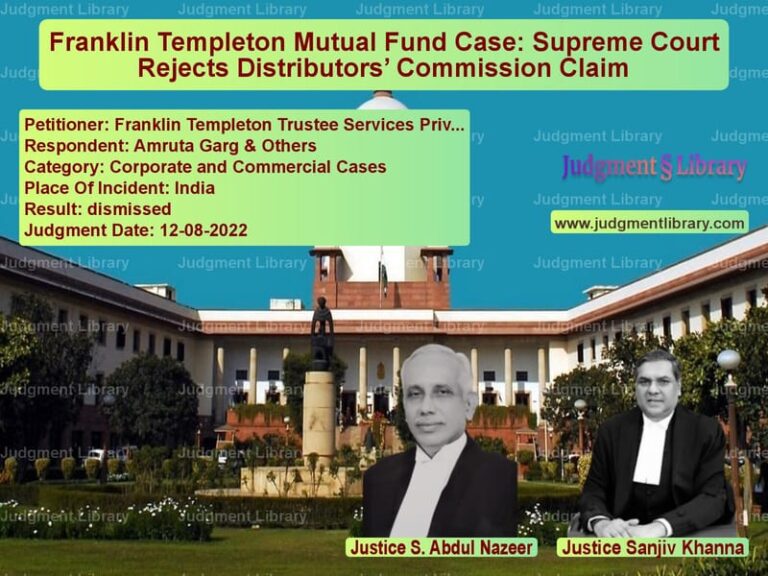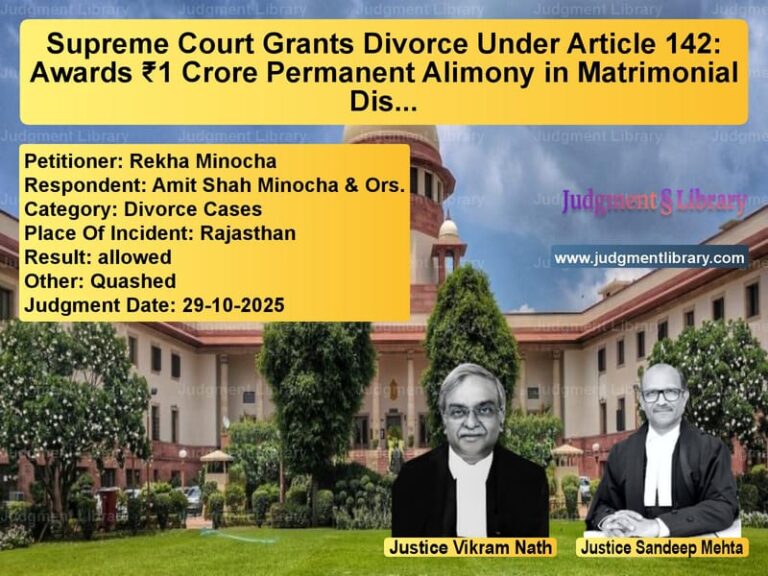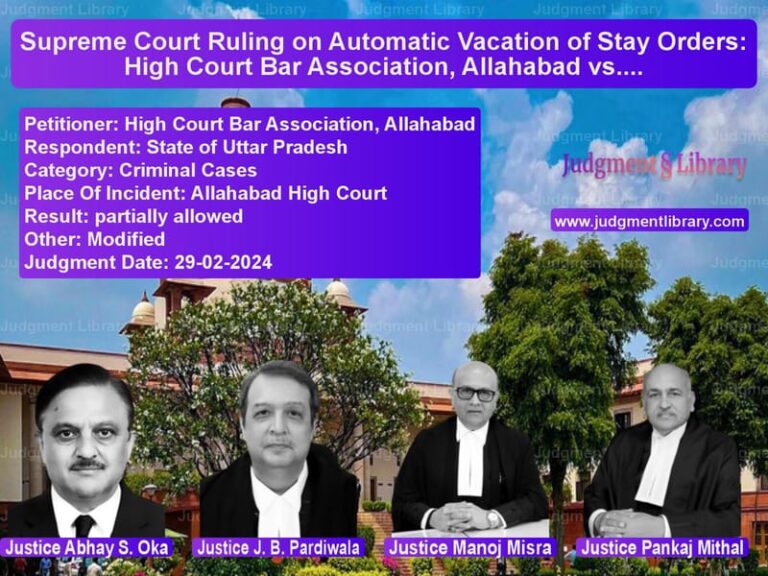Supreme Court’s Landmark Judgment on Admission Process: Upholding Fairness and Addressing Ambiguities in Prospectus
The Supreme Court of India, in the case of S. Gunasekaran vs. The Under Secretary to Govt. and Others, delivered an important judgment on December 17, 2024, addressing the issue of the admission process for the Academic Year 2022-23 in medical courses. The case revolved around the appellant’s resignation from a course after a change in the admission rules midway through the process, and the unfair penalties imposed as a result. The Court’s ruling highlights the importance of clarity in admission guidelines and the need for fair treatment of students caught in procedural ambiguities.
Background of the Case
The appellant, S. Gunasekaran, participated in the admission process for the M.D. (Endocrinology) course at one of India’s premier medical institutions, Respondent No. 4 College. Initially, under the prospectus available on the official website on April 8, 2022, the appellant had been allotted a seat in the M.D. (Endocrinology) course during the first round of counseling. He joined the course on April 14, 2022, and his admission was accepted by the college.
However, in the second round of counseling, the result was announced on April 26, 2022, and the appellant did not receive any upgradation. According to the guidelines in the prospectus, a candidate who was not upgraded in the second round had the option to resign from their seat. The appellant did so by submitting his resignation on the same day, i.e., April 26, 2022, following the guidelines as per the original prospectus.
Despite the appellant’s timely resignation, Respondent No. 4 College demanded a penalty of ₹30 lakhs under the terms of a bond signed at the time of admission. The college further refused to release the appellant’s documents until the penalty was paid.
Legal Issues Raised
- Whether the appellant’s resignation from the course in accordance with the original prospectus entitled him to exit with forfeiture of the security deposit, or whether he should be penalized under the amended provisions.
- Whether the amendment to the prospectus after the admission process had started created unfair confusion and adversely affected the appellant’s decision.
- Whether the appellant should be required to pay a penalty of ₹30 lakhs when the change in the rules after the admission process was initiated led to a procedural inconsistency.
Arguments Presented
Arguments by the Appellant
- The appellant argued that he had adhered to the guidelines set forth in the original prospectus when he submitted his resignation after not receiving any upgradation in the second round.
- The appellant contended that the amendment to the prospectus on April 20, 2022, created confusion and made it impossible for him to act with full knowledge of the revised terms.
- The appellant emphasized that the penalty clause was unfair and excessive given that the resignation had been timely and in line with the original rules outlined in the first prospectus.
- The appellant also argued that the college had not notified the amended terms before the commencement of the counseling process and, as such, should not enforce the new penalty clause retroactively.
Arguments by the Respondents (College and Authorities)
- The respondents, representing the college, argued that the appellant’s resignation was in violation of the amended rules, which stipulated that resignation after the second round would incur a penalty.
- The respondents also contended that the original prospectus was amended to clarify the terms regarding resignation, and the appellant should have been aware of this change when he submitted his resignation.
- They further argued that the penalty imposed was in accordance with the bond signed by the appellant at the time of admission, which contained clear provisions regarding financial penalties in the event of a resignation.
- The respondents suggested that despite the unfortunate circumstances, the penalty clause had been communicated to the appellant, and his failure to comply warranted the fine.
Supreme Court’s Observations
On the Original and Amended Prospectus
The Court observed that the original prospectus, which the appellant relied on, allowed a candidate to exit with forfeiture of the security deposit if no upgradation occurred. The amended version, introduced after the counseling process began, altered this provision by imposing a financial penalty. The Court held:
“The amendment to the prospectus, made midway through the counseling process, created confusion. It is unreasonable to penalize candidates who acted in accordance with the terms of the original prospectus.”
On the Responsibility of the Authorities
The Court found that the authorities had failed to ensure proper communication of the revised rules before the counseling process commenced. The Court noted:
“Respondent Nos.1 to 3 should have acted with greater diligence in finalizing and communicating the final terms of the prospectus before the counseling process began. This failure has led to unnecessary confusion and hardship for the appellant.”
On the Imposition of the ₹30 Lakh Penalty
The Court expressed concern over the excessive penalty and noted that:
“The penalty of ₹30 lakhs appears disproportionate to the circumstances. Given the confusion created by the late amendment to the prospectus, the appellant should not be penalized to such an extent.”
The Court also referred to the case of Ranjan Kumar v. Delhi University (2017), where it was held that penalties imposed in educational and admission disputes should be reasonable and fair:
“In cases involving admission-related disputes, penalties must reflect the nature of the default and cannot be punitive or excessive.”
Final Verdict
- The Supreme Court allowed the appeal, reducing the penalty imposed on the appellant from ₹30 lakhs to a forfeiture of the amount already deposited, i.e., ₹4,06,749.60.
- The Court directed that the sum of ₹2,00,000, deposited with Respondent No.2, be refunded to Respondent No.4, and the college was to forfeit only ₹2,06,749.60 of the total deposit.
- The Court ordered that all documents of the appellant be released by Respondent No.4 within two weeks of the judgment.
- Finally, the Court placed on record the generous gesture by Respondent No.4, which chose to donate the forfeited amount to the Missionaries of Charity, Kolkata, highlighting their commitment to social causes.
Implications of the Judgment
- Fairness in Admission Processes: The judgment sets a precedent for ensuring that admission processes are conducted with clarity and fairness, particularly in cases where procedural changes are made midway.
- Penalty and Accountability: It reinforces the principle that penalties should not be excessive or punitive and should align with the nature of the violation.
- Transparency in Communication: The ruling stresses the importance of timely and transparent communication from educational institutions, especially regarding changes to admission rules.
- Justice for Affected Students: The decision ensures that students who are affected by changes in rules due to no fault of their own are not subjected to undue financial hardship.
This case emphasizes the role of the judiciary in protecting the rights of students and ensuring that educational institutions adhere to principles of fairness and transparency in their admissions processes.
Petitioner Name: S. Gunasekaran.Respondent Name: The Under Secretary to Govt. and Others.Judgment By: Justice B.R. Gavai, Justice K.V. Viswanathan.Place Of Incident: Madras, Tamil Nadu.Judgment Date: 19-12-2024.
Don’t miss out on the full details! Download the complete judgment in PDF format below and gain valuable insights instantly!
Download Judgment: s.-gunasekaran-vs-the-under-secretary-supreme-court-of-india-judgment-dated-19-12-2024.pdf
Directly Download Judgment: Directly download this Judgment
See all petitions in Contract Disputes
See all petitions in Property Disputes
See all petitions in Specific Performance
See all petitions in Judgment by B R Gavai
See all petitions in Judgment by K.V. Viswanathan
See all petitions in allowed
See all petitions in Modified
See all petitions in supreme court of India judgments December 2024
See all petitions in 2024 judgments
See all posts in Civil Cases Category
See all allowed petitions in Civil Cases Category
See all Dismissed petitions in Civil Cases Category
See all partially allowed petitions in Civil Cases Category

